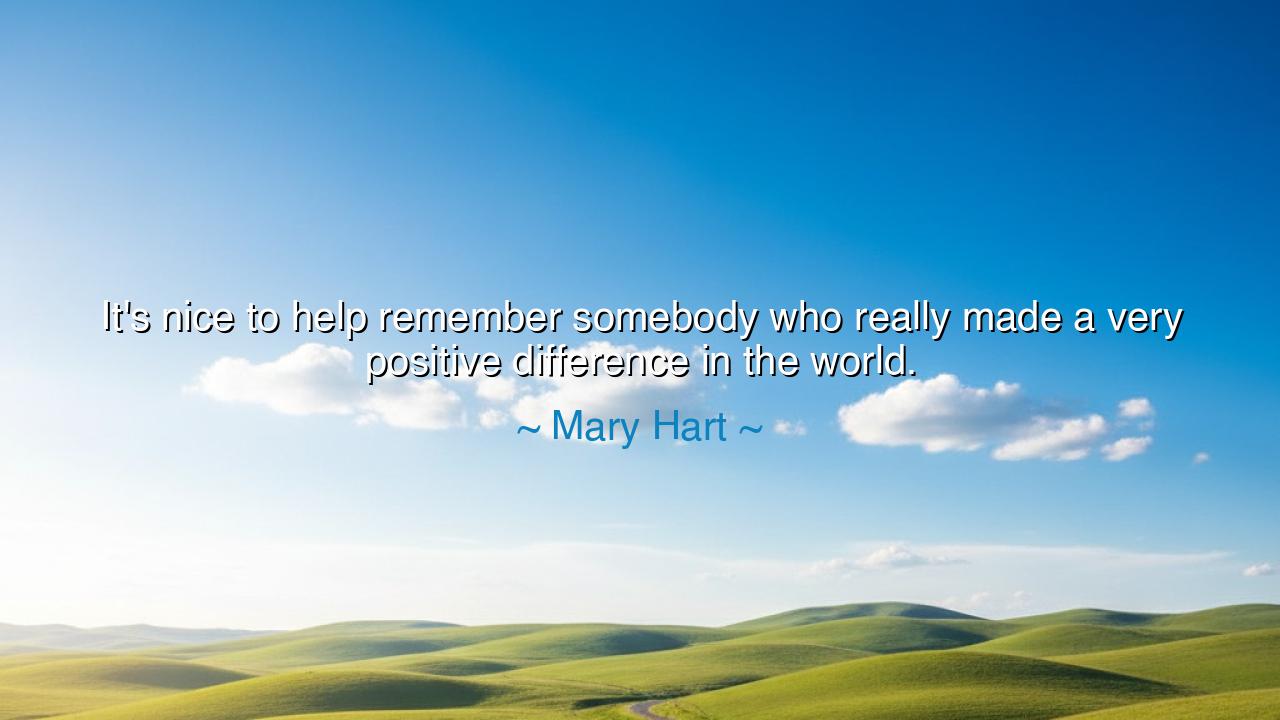
It's nice to help remember somebody who really made a very
It's nice to help remember somebody who really made a very positive difference in the world.






The words of Mary Hart — “It’s nice to help remember somebody who really made a very positive difference in the world.” — shine like a flame in the long night of forgetfulness. They remind us that memory is not merely a reflection of the past, but a sacred duty. To remember is to give life anew, to breathe spirit into the deeds of those whose bodies have returned to dust. Thus the act of remembrance becomes an offering, a bridge between the living and the departed.
For when one has made a positive difference, their echo lingers beyond their years, shaping lives they will never touch with their hands. In this way, the great are never wholly gone; they live on in the stories told, the lessons preserved, the virtues imitated. To speak of them is to draw their light into the present moment. The ancients knew this well: they sang epics of warriors and sages so that the hearts of future generations might not grow dim.
Consider Florence Nightingale, the Lady with the Lamp. In the Crimean War she walked among the wounded, bringing order to chaos, and light to despair. Her touch saved lives, but her legacy — sanitation, compassion, the dignity of care — saved millions long after her passing. Each time her name is spoken, each time her deeds are told, she rises again, not in body, but in spirit. Here lies the truth of Hart’s words: that to remember is itself a gift, as vital as the original deed.
The act of remembrance also nourishes the soul of the living. When we lift up the names of the noble, we are reminded of what mankind can achieve, even in the face of darkness. Their lives become stars by which we navigate our own troubled seas. To forget them is to lose our compass; to recall them is to steady our course. Thus remembrance is not only honor to the dead, but strength to the living.
Let the generations learn this wisdom: do not let the fire of memory be extinguished. For each soul who made a difference is a torchbearer in the procession of history, passing the flame to those who come after. If we carry it faithfully, the world shall not stumble in darkness. Mary Hart’s gentle words are thus a call to duty — to remember, to cherish, and to continue the light.






BBluong thi be bong
Mary Hart’s quote brings attention to the idea of remembrance, but how do we ensure that this act of remembering someone truly honors their positive impact? How can we take action to continue their work and carry forward the lessons they taught us? Is the true measure of a person’s contribution not just in being remembered, but in how their legacy shapes future generations?
TTTran Thao Trang
It’s truly uplifting to think about honoring someone who has made a positive difference. But can we always separate the good from the bad when we look at a person’s legacy? In some cases, the very people we admire for their contributions may have also caused harm in other areas. How do we balance the desire to remember the good with the need to critically assess a person’s full impact?
KNNguyen Khanh Ngoc
Mary Hart’s comment on remembering those who made a difference is a lovely thought, but I’m curious about how much of this memory is shaped by time and public perception. How often do we focus on the positive aspects of someone’s life and legacy while ignoring the more complicated or flawed parts of their character? Can someone truly be defined solely by their positive contributions?
DNDat Nguyen
I agree with Mary Hart’s sentiment, but I wonder how we choose who to remember. What criteria determine whether someone has made a ‘positive difference’? Is it about the size of their contributions or the personal impact they had on others? Should the act of remembering someone always come with a deeper reflection on their work and its long-term effects on society?
TTeo
Mary Hart’s quote reflects a thoughtful sentiment about honoring individuals who’ve made a lasting, positive impact. But what does it mean to truly make a ‘positive difference’? Is it enough to be remembered for our actions, or should we actively work to continue creating change after we’re gone? How do we ensure that the people we celebrate actually represent the values we strive for in the world?